八大时态综合讲解及专项练习题共八页-打印版
(2021年整理)初中英语八大时态讲解及练习(全)
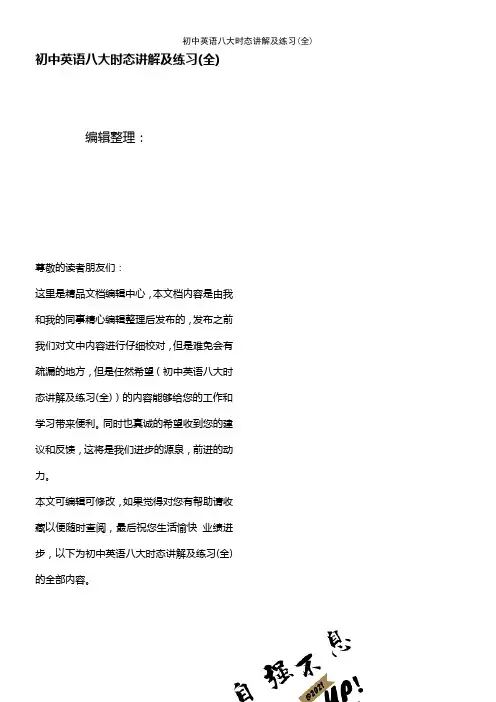
初中英语八大时态讲解及练习(全) 初中英语八大时态讲解及练习(全)编辑整理:尊敬的读者朋友们:这里是精品文档编辑中心,本文档内容是由我和我的同事精心编辑整理后发布的,发布之前我们对文中内容进行仔细校对,但是难免会有疏漏的地方,但是任然希望(初中英语八大时态讲解及练习(全))的内容能够给您的工作和学习带来便利。
同时也真诚的希望收到您的建议和反馈,这将是我们进步的源泉,前进的动力。
本文可编辑可修改,如果觉得对您有帮助请收藏以便随时查阅,最后祝您生活愉快业绩进步,以下为初中英语八大时态讲解及练习(全)的全部内容。
一、一般现在时:概念:经常、反复发生的动作或行为及现在的某种状况。
时间状语:always, usually, often, sometimes, every week (day, year, month…), once a week, on Sundays, etc。
基本结构:①be动词;②行为动词否定形式:①am/is/are+not;②此时态的谓语动词若为行为动词,则在其前加don’t,如主语为第三人称单数,则用d oesn’t,同时还原行为动词。
一般疑问句:①把be动词放于句首;②用助动词do提问,如主语为第三人称单数,则用does,同时,还原行为动词。
在一般现在时中,当主语是第三人称单数时,谓语动词要用第三人称单数形式,即常在动词原形后加-s或—es。
一、人称代词he, she, it是第三人称单数。
如:He likes watching TV. 他喜欢看电视。
She has lunch at twelve。
她十二点吃午餐.It looks like a cat. 它看起来像只猫.(口诀:I用am,you用are,is用于她他它,单数名词用is,复数名词都用are)二、单个人名、地名或称呼作主语;是第三人称单数。
如:①Han Mei looks like her mother。
韩梅看起来像她的母亲。
初中英语八大时态全套精讲及练习题(K12教育文档)
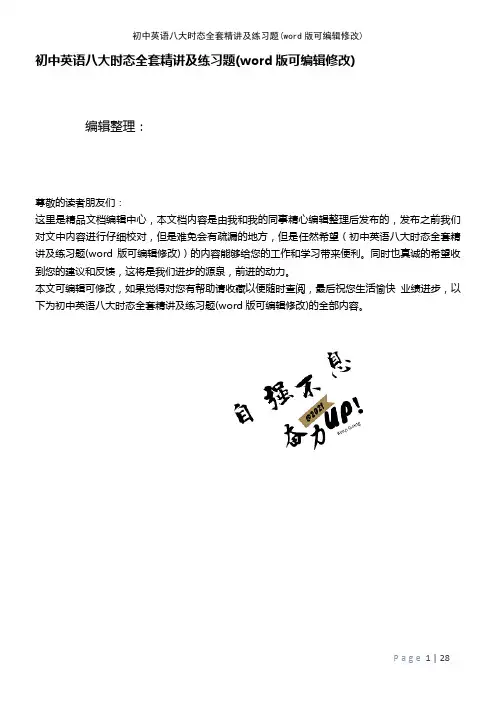
初中英语八大时态全套精讲及练习题(word版可编辑修改)编辑整理:尊敬的读者朋友们:这里是精品文档编辑中心,本文档内容是由我和我的同事精心编辑整理后发布的,发布之前我们对文中内容进行仔细校对,但是难免会有疏漏的地方,但是任然希望(初中英语八大时态全套精讲及练习题(word版可编辑修改))的内容能够给您的工作和学习带来便利。
同时也真诚的希望收到您的建议和反馈,这将是我们进步的源泉,前进的动力。
本文可编辑可修改,如果觉得对您有帮助请收藏以便随时查阅,最后祝您生活愉快业绩进步,以下为初中英语八大时态全套精讲及练习题(word版可编辑修改)的全部内容。
初中英语八大时态全套精讲及练习题.1 一般现在时的用法1)经常性或习惯性的动作,常与表示频度的时间状语连用。
时间状语: every…, sometimes,ofen,always,usually, twice a week, at…, on Sunday I leave home for school at 7 everymorning。
He watches Tv once a week 。
2) 客观真理,客观存在,科学事实.The earth moves around the sun。
Shanghai lies in the east of China.3)表示格言或警句中。
Pride goes before a fall。
骄者必败。
注意:此用法如果出现在宾语从句中,即使主句是过去时,从句谓语也要用一般现在时。
例:Columbus proved that the earth is round。
.4) 现在时刻的状态、能力、性格、个性.I don't want so much.Ann Wang writes good English but does not speak well。
比较:Now I put the sugar in the cup.I am doing my homework now。
初中英语八大时态讲解及练习全
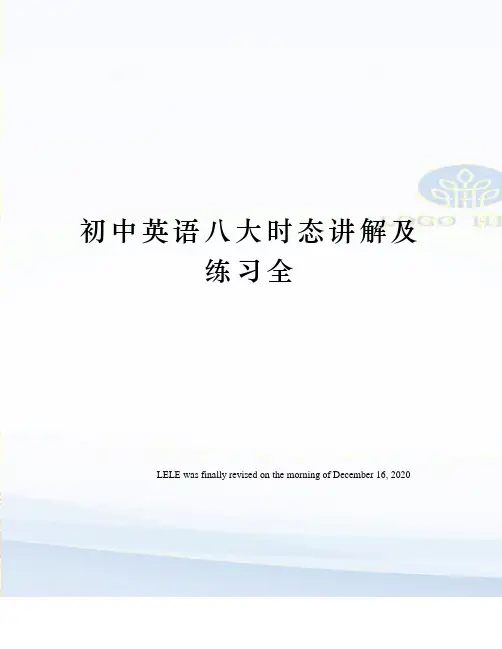
初中英语八大时态讲解及练习全LELE was finally revised on the morning of December 16, 2020一、一般现在时:概念:经常、反复发生的动作或行为及现在的某种状况。
时间状语:always, usually, often, sometimes, every week (day, year, month…), once a week, on Sundays, etc.基本结构:①be动词;②行为动词否定形式:①am/is/are+not;②此时态的谓语动词若为行为动词,则在其前加don't,如主语为第三人称单数,则用doesn't,同时还原行为动词。
一般疑问句:①把be动词放于句首;②用助动词do提问,如主语为第三人称单数,则用does,同时,还原行为动词。
在中,当主语是时,谓语动词要用形式,即常在后加-s或-es。
一、he, she, it是第三人称单数。
如:He likes watching TV. 他喜欢看电视。
She has lunch at twelve. 她十二点吃午餐。
It looks like a cat. 它看起来像只猫。
(口诀:I用am,you用are,is用于它,单数名词用is,都用are)二、单个人名、地名或称呼作主语;是第三人称单数。
如:①Han Mei looks like her mother. 看起来像她的母亲。
②Beijing is in China. 北京在中国。
③Uncle Wang often makes cakes. 王叔叔经常做蛋糕。
三、单数可数名词或"this / that / the+单数可数名词"作主语时,是第三人称单数。
如:①A horse is a useful animal. 马是有用的动物。
②This book is yours. 这本书是你的。
四、someone, somebody, nobody, everything, something等及指示代词this, that作主语时,是第三人称单数。
初中英语八大时态详解及专项训练(附答案)(期末复习资料)!
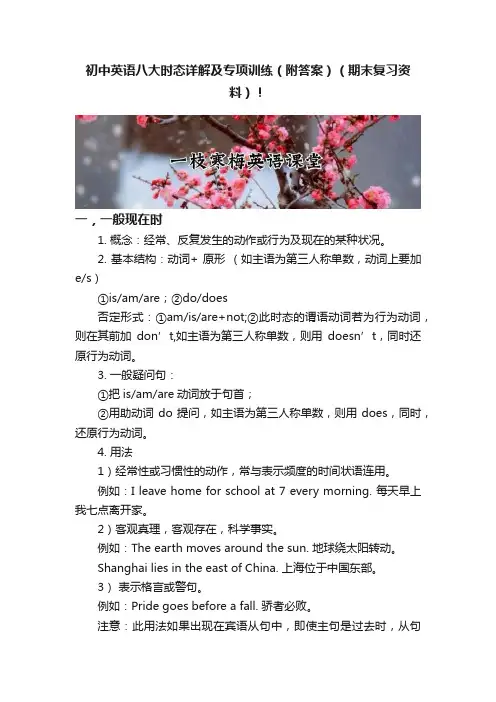
初中英语八大时态详解及专项训练(附答案)(期末复习资料)!一,一般现在时1. 概念:经常、反复发生的动作或行为及现在的某种状况。
2. 基本结构:动词+ 原形(如主语为第三人称单数,动词上要加e/s)①is/am/are;②do/does否定形式:①am/is/are+not;②此时态的谓语动词若为行为动词,则在其前加don’t,如主语为第三人称单数,则用doesn’t,同时还原行为动词。
3. 一般疑问句:①把is/am/are动词放于句首;②用助动词do提问,如主语为第三人称单数,则用does,同时,还原行为动词。
4. 用法1)经常性或习惯性的动作,常与表示频度的时间状语连用。
例如:I leave home for school at 7 every morning. 每天早上我七点离开家。
2)客观真理,客观存在,科学事实。
例如:The earth moves around the sun. 地球绕太阳转动。
Shanghai lies in the east of China. 上海位于中国东部。
3)表示格言或警句。
例如:Pride goes before a fall. 骄者必败。
注意:此用法如果出现在宾语从句中,即使主句是过去时,从句谓语也要用一般现在时。
例如:Columbus proved that the earth is round. 哥伦布证实了地球是圆的。
4)现在时刻的状态、能力、性格、个性。
例如:I don't want so much. 我不要那么多。
He writes good English but does not speak well.他英语写得不错,讲的可不行。
5)一般现在时表示将来含义。
a. 下列动词come, go, arrive, leave, start, begin, return的一般现在时可以表示将来,主要用来表示在时间上已确定或安排好的事情。
例如:The train leaves at six tomorrow morning. 火车明天上午六点开。
八大时态综合讲解及专项练习题共八页打印版
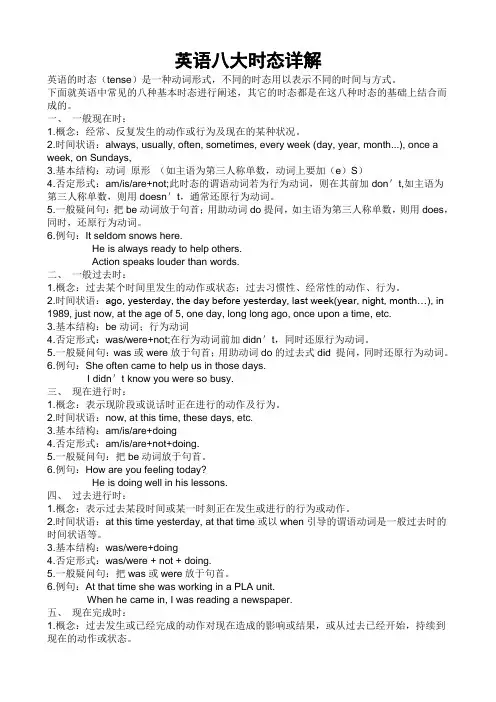
e.g We clean the room every day.
2.一般过去时:主语+did
e.g We cleaned the room just now.
3.现在进行时:主语+am/is/are doing
e.g We are cleaning the room now.
3.基本结构:be动词;行为动词
4.否定形式:was/were+not;在行为动词前加didn't,同时还原行为动词。
5.一般疑问句:was或were放于句首;用助动词do的过去式did提问,同时还原行为动词。
6.例句:She often came to help us in those days.
A. went swimming B. go swimming C. visited grandparents
一般过去时
一.用“am , is , was”填空
1. I _____ a teacher now. I _____ a student five years ago.
2. Where ______ it now?
6.例句:It seldom snows here.
He is always ready to help others.
Action speaks louder than words.
二、一般过去时:
1.概念:过去某个时间里发生的动作或状态;过去习惯性、经常性的动作、行为。
2.时间状语:ago, yesterday, the day before yesterday, last week(year, night, month…), in 1989, just now, at the age of 5, one day, long long ago, once upon a time, etc.
初中八种基本时态讲解及练习

英语语法(时态)[注意] 在其它的时态中也存在类似问题,记住,关键是:瞬间动词不能和表达一段时间的状语连用。
如:How long may I keep the book?(这本书我能借多久?)(句子中keep 取代了borrow)注意:句型变化时,否定句在am /is /are /will /have /has /was /were /had /would 后面加not,而且not都可以缩写为n’t (am后面not不可以缩写);疑问句将am /is /are /will /have /has /was /were /had /would 提前到句首。
八种时态的具体用法:(1)一般现在时:表示现阶段经常或习惯发生的动作或存在的状态,或说明主语的特征。
①一般现在时句子中常有的时间状语:often,usually,sometimes,always,every (day等), once/twice,a (week等), on (Sunday等),never,in the (morning等)。
如:They go to the Palace Museum once a year.(他们每年去一次故宫)/They often discuss business in the evening.(他们经常在晚上商谈生意)②表示客观真理、事实、人的技能或现在的状态时句子里一般不用时间状语。
如:The earth turns round the sun.(地球绕着太阳转)/Light travels faster than sound.(光传播比声音快)③表示十分确定会发生(如安排好的事情)或按照时间表进行的事情,用一般现在可以表达将来,句子中可以有将来时间。
如:The train for Haikou leaves at 8:00 in the morning.(开往海口的列车上午8点开车)④在时间状语从句中(以when, after, before, while, until, as soon as等引导)和条件状语从句中(以if,unless引导),用一般现在时代替一般将来时,句子可以有将来时间。
初中英语八大时态全套精讲及练习题(附答案)
初中英语八大时态全套精讲及练习题.1 一般此刻时的用法1)常常性或习惯性的动作,常与表示频度的时间状语连用。
时间状语: every, , sometimes,ofen,always,usually, twice a week, at , , on Sunday Ileave home for school at 7 every morning. He watches Tv once a week .2) 客观真谛,客观存在,科学事实。
The earth moves around the sun. Shanghai lies in the east of China.3) 表示格言或警语中。
Pride goes before a fall. 骄者必败。
注意:此用法假如出此刻宾语从句中,即便主句是过去时,从句谓语也要用一般此刻时。
例:Columbus proved that the earth is round..4) 此刻时辰的状态、能力、性格、个性。
I don't want so much.Ann Wang writes good English but does not speak well.比较:Now I put the sugar in the cup.I am doing my homework now.第一句用一般此刻时,用于操作演示或指导说明的示范性动作,表示言行的瞬时动作。
再如: Now watch me, I switch on the current and stand back.第二句中的now 是进行时的标记,表示正在进行的动作的客观状况,所此后句用一般此刻时。
二 . 组成及变化1、 be 动词的变化必定句:主语 +be(am,is,are)+其余。
如: I am a boy. 我是一个男孩。
否认句:主语 + be + not +其余。
如: He is not a worker. 他不是工人。
完整word版八大时态综合讲解及专项练习题共八页打印版范文
英语八大时态详解英语的时态(tense)是一种动词形式,不同的时态用以表示不同的时间与方式。
下面就英语中常见的八种基本时态进行阐述,其它的时态都是在这八种时态的基础上结合而成的。
一、一般现在时:1.概念:经常、反复发生的动作或行为及现在的某种状况。
2.时间状语:always, usually, often, sometimes, every week (day, year, month...), once aweek, on Sundays,3.基本结构:动词原形(如主语为第三人称单数,动词上要加(e)S)4.否定形式:am/is/are+not;此时态的谓语动词若为行为动词,则在其前加don't,如主语为第三人称单数,则用doesn't,通常还原行为动词。
5.一般疑问句:把be动词放于句首;用助动词do提问,如主语为第三人称单数,则用does,同时,还原行为动词。
6.例句:It seldom snows here.He is always ready to help others.Action speaks louder than words.二、一般过去时:1.概念:过去某个时间里发生的动作或状态;过去习惯性、经常性的动作、行为。
2.时间状语:ago, yesterday, the day before yesterday, last week(year, night, month…), in1989, just now, at the age of 5, one day, long long ago, once upon a time, etc.3.基本结构:be动词;行为动词4.否定形式:was/were+not;在行为动词前加didn't,同时还原行为动词。
5.一般疑问句:was或were放于句首;用助动词do的过去式did 提问,同时还原行为动词。
6.例句:She often came to help us in those days.I didn't know you were so busy.三、现在进行时:1.概念:表示现阶段或说话时正在进行的动作及行为。
(完整word)初中英语八大时态的详细讲解与练习
初中英语语法:八种时态详解与练习一.概念:英语中表示不同时间发生的动作或存在的状态,需用不同的动词形式表示,这种不同的动词形式称为时态。
二.种类:(基本时态)一般现在时一般过去时现在进行时过去进行时一般将来时过去将来时现在完成时过去完成时一般现在时一、概念:经常、反复发生的动作或行为及现在的某种状况。
二、常搭配的时间状语:always, usually, often, sometimes, every week (day, year, month…), once a week,on Sundays, etc.三、基本结构①be动词(is,am,are);②行为动词(主语是第三人称单数时谓语动词要加s或es外) 否定形式:①am/is/are+not;②此时态的谓语动词若为行为动词,则在其前加don't,如主语为第三人称单数,则用doesn't,同时还原行为动词。
一般疑问句:①把be动词放于句首;②用助动词do提问,如主语为第三人称单数,则用does,同时,还原行为动词。
例句:I go to school at 6 every morning. 每天早上我七点去上学。
Summer follows spring. 春天之后是夏天。
I learned that the earth goes around the sun when I was in primary school. 我在小学就学过地球是围绕太阳转的。
Pride goes before a fall. 骄者必败。
四、基本用法:1) 描述当前时间内经常出现、反复发生的动作或存在的状态。
在这种情景中,句子常带有表示频率的时间状语:always , everyday , often , once a week (month , year , etc.) , sometimes , seldom , usually等等,以表示句中的动作或状态是习惯性的、经常性的。
初中英语八大时态讲解及练习(全)
一、一般现在时:概念:经常、反复发生的动作或行为及现在的某种状况。
时间状语:always, usually, often, sometimes, every week (day, year, month…), once a week, on Sundays, etc.基本结构:①be动词;②行为动词否定形式:①am/is/are+not;②此时态的谓语动词若为行为动词,则在其前加don't,如主语为第三人称单数,则用doesn't,同时还原行为动词。
一般疑问句:①把be动词放于句首;②用助动词do提问,如主语为第三人称单数,则用does,同时,还原行为动词。
在一般现在时中,当主语是第三人称单数时,谓语动词要用第三人称单数形式,即常在动词原形后加-s或-es。
一、人称代词he, she, it是第三人称单数。
如:He likes watching TV. 他喜欢看电视。
She has lunch at twelve. 她十二点吃午餐。
It looks like a cat. 它看起来像只猫。
(口诀:I用am,you用are,is用于她他它,单数名词用is,复数名词都用are)二、单个人名、地名或称呼作主语;是第三人称单数。
如:①Han Mei looks like her mother. 韩梅看起来像她的母亲。
②Beijing is in China. 北京在中国。
③Uncle Wang often makes cakes. 王叔叔经常做蛋糕。
三、单数可数名词或"this / that / the+单数可数名词"作主语时,是第三人称单数。
如:①A horse is a useful animal. 马是有用的动物。
②This book is yours. 这本书是你的。
四、不定代词someone, somebody, nobody, everything, something等及指示代词this, that 作主语时,是第三人称单数。
- 1、下载文档前请自行甄别文档内容的完整性,平台不提供额外的编辑、内容补充、找答案等附加服务。
- 2、"仅部分预览"的文档,不可在线预览部分如存在完整性等问题,可反馈申请退款(可完整预览的文档不适用该条件!)。
- 3、如文档侵犯您的权益,请联系客服反馈,我们会尽快为您处理(人工客服工作时间:9:00-18:30)。
英语八大时态详解英语的时态(tense)是一种动词形式,不同的时态用以表示不同的时间与方式。
下面就英语中常见的八种基本时态进行阐述,其它的时态都是在这八种时态的基础上结合而成的。
一、一般现在时:1.概念:经常、反复发生的动作或行为及现在的某种状况。
2.时间状语:always, usually, often, sometimes, every week (day, year, month...), oncea week, on Sundays,3.基本结构:动词原形(如主语为第三人称单数,动词上要加(e)S)4.否定形式:am/is/are+not;此时态的谓语动词若为行为动词,则在其前加don't,如主语为第三人称单数,则用doesn't,通常还原行为动词。
¥5.一般疑问句:把be动词放于句首;用助动词do提问,如主语为第三人称单数,则用does,同时,还原行为动词。
6.例句:It seldom snows here.He is always ready to help others.Action speaks louder than words.二、一般过去时:1.概念:过去某个时间里发生的动作或状态;过去习惯性、经常性的动作、行为。
2.时间状语:ago, yesterday, the day before yesterday, last week(year, night, month…), in 1989, just now, at the age of 5, one day, long long ago, once upon a time, etc.3.基本结构:be动词;行为动词—4.否定形式:was/were+not;在行为动词前加didn't,同时还原行为动词。
5.一般疑问句:was或were放于句首;用助动词do的过去式did 提问,同时还原行为动词。
6.例句:She often came to help us in those days.I didn't know you were so busy.三、现在进行时:1.概念:表示现阶段或说话时正在进行的动作及行为。
2.时间状语:now, at this time, these days, etc.3.基本结构:am/is/are+doing,4.否定形式:am/is/are+not+doing.5.一般疑问句:把be动词放于句首。
6.例句:How are you feeling todayHe is doing well in his lessons.四、过去进行时:1.概念:表示过去某段时间或某一时刻正在发生或进行的行为或动作。
2.时间状语:at this time yesterday, at that time或以when引导的谓语动词是一般过去时的时间状语等。
3.基本结构:was/were+doing《4.否定形式:was/were + not + doing.5.一般疑问句:把was或were放于句首。
6.例句:At that time she was working in a PLA unit.When he came in, I was reading a newspaper.五、现在完成时:1.概念:过去发生或已经完成的动作对现在造成的影响或结果,或从过去已经开始,持续到现在的动作或状态。
2.时间状语:recently, l ately, since…for…,in the past few years, etc.3.基本结构:have/has + done`4.否定形式:have/has + not +done.5.一般疑问句:have或has提前6.例句:I've written an article.It has been raining these days.六、过去完成时:1.概念:以过去某个时间为标准,在此以前发生的动作或行为,或在过去某动作之前完成的行为,即“过去的过去”。
2.时间状语:before, by the end of last year(term, month…),etc.3.基本结构:had + done.-4.否定形式:had + not + done.5.一般疑问句:had放于句首。
6.例句:As soon as we got to the station, the train had left.By the end of last month. We had reviewed four books七、一般将来时:1.概念:表示将要发生的动作或存在的状态及打算、计划或准备做某事。
2.时间状语:tomorrow, next day(week, month, year…),soon, in a few minutes, by…,the day after tomorrow, etc.3.基本结构:am/is/are/going to + do;will/shall + do.(4.否定形式:was/were + not; 在行为动词前加won't,同时还原行为动词。
5.一般疑问句:be放于句首;will/shall提到句首。
6.例句:They are going to have a competition with us in studies.It is going to rain.八、过去将来时:1.概念:立足于过去某一时刻,从过去看将来,常用于宾语从句中。
2.时间状语:the next day(morning, year…),the following month(week…),etc.3.基本结构:was/were/going to do;would/should + do.`4.否定形式:was/were/not + going to + do;would/should + not + do.5.一般疑问句:was或were放于句首;would/should 提到句首。
6.例句:He said he would go to Beijing the next day.I asked who was going there .1.一般现在时: 主语+do/does(现在分词)We clean the room every day.2.一般过去时: 主语+did。
We cleaned the room just now.3.现在进行时: 主语+am/is/are doingWe are cleaning the room now.4.过去进行时: was/were doingWe were cheaning the room at 5:00 yesterday afternoon.5.现在完成时: have/has donehave cleaned the room already.6.过去完成时: had done!We had cleaned the room before he arrived.7.一般将来时: will do/We will clean the room tomorrow.8.过去将来时: was/were to /would doHe said he would clean the room next.八大时态习题训练一般现在时^一、用动词适当形式填空often____(play) in the playground.always_____(get) up at six o'clock.(brush) your teeth every morninghe usually_______ (do) after school二、选择填空1. _________Alice often play the piano No, she __________.A. Do; doB. Does; doesC. Does; doesn’t(2. ________ your pen friend _______ in BeijingA. Do; liveB. Do; livesC. Does; live3. Tom and Mike _______ very excited, they will take a trip.A. isB. areC. am4. I like ________ very much. What about youA. danceB. dancedC. dancing5. I can’t fi nd my pen. Let me _______.A. go and ask herB. go and ask hersC. go and ask she|6. Fangfang is a good student. She _______maths.A. does good atB. well do itC. is good at7. The kite _______ a bird. A. look like B. is looking C. looks like8. Bill and I _______ good friends.A. isB. areC. am9. Sandy often ________ his homework on Sundays .A. doB. doesC. did10. What do you usually do on the weekend I __________.!A. went swimmingB. go swimmingC. visited grandparents一般过去时一.用“am , is , was”填空1. I _____ a teacher now. I _____ a student five years ago.2. Where ______ it now?3. Where ______ it last Sunday?4. Yang Ling ______ at home now. But she ______ at school yesterday.二.用所给动词的适当形式填空_______ (visit) a farm last week.2. The twins _______ (water) the flowers in the garden yesterday morning.3. I _______ (watch) a film with my friend last Friday.4. My father _______ (be) in London last year.5. What_______ (do) you do three days ago?6. _______ (be) there any parks here in 1950?7. What_________(do) you do just now I __________ (wash) my clothes.三.用所给词的适当形式填空1. It ______ (be) there just now, but it isn’t there now.2. Where’s the camera It ________ (is) there a moment ago.3. It _______ (be) Helen’s birthday yesterday.4. Tom _______(go ) to visit a farm last week.5. I _______ (watch) a film with my friend last Friday.6. My father _______ (be) in London last year.7. What_______ (do) you do three days ago?8. Where ______ (be) you just now?I _______ (be) in the classroom.9. What ______ you _______(do) last Friday?We ________(water) trees on the farm.|一般将来时一、用动词适当形式填空1、I ______ (be) tired. I ______ (go) to bed early tonight.2、Mary’s birthday is nex t Monday, her mother _______ (give) her a present.3、It is very cold these days. It ______ (snow) soon.4、I am afraid there _______ (be) a meeting this afternoon. I can’t go with you.5、Most of us don’t think their team _______ (win).6、I _____ (be) thirty-five next year.&7、My father __________ (leave) Shanghai next Tuesday.8、_______ we _______ (go) to see a film tonight9、______ you _______ (be) at home tomorrow afternoonNo. I _________ . I _______ (go) to town with my friend.二、选择填空1. There __________ a meeting tomorrow afternoon.A. will be going toB. will going to beC. is going to beD. will go to be2. Charlie ________ here next month.,A. isn’t workingB. doesn’t workingC. isn’t going to workingD. won’t work3. He ________ very busy this week, he ________ free next week.A. will be; isB. is; isC. will be; will beD. is; will be4. There ________ a dolphin show in the zoo tomorrow evening.B. is going to haveC. will haveD. is going to be5. –________ you ________ free tomorrow– No. I ________ free the day after tomorrow.A. Are; going to; willB. Are; going to be; willC. Are; going to; will beD.Are; going to be; will be$6. Mother ________ me a nice present on my next birthday.A. will giveB. will giveC. givesD. give7. – Where is the morning paper– I ________ it for you at once.A. getB. am gettingC. to getD. will get8. ________ a concert next SaturdayA. There will beB. Will there beC. There can beD. There are9. If they come, we ________ a meeting.A. haveB. will haveC. hadD. would have10. He ________ to us as soon as he gets there.A. writesB. has writtenC. will writeD. wrote11. He ________ in three days.A. coming backB. came backC. will come backD. is going to coming back12. If it ________ tomorrow, we’ll go roller-skating.A. isn’t rainB. won’t rainC. doesn’t rainD. doesn’t fine—现在进行时一、选择填空( )!The twins_____their mother do the housework.(A)are wanting (B)help(C)are helping (D)are looking( ) the birds doing They are singing in a tree.(A)Who (B)What(C)How (D)Where"( ) are you listening_____(A)/ (B)for(C)at (D)to( )! She____in the classroom.(A)is singing (B)sing(C)to sing (D)is sing( ) Jim______ his white shirt and brown trousers.(A)is putting on (B)wear~(C)put on (D)is wearing二、用所给的动词的正确形式填空boy __________( draw)a picture now.2. Listen!Some girls _______________ ( sing)in the classroom .3. My mother _________________ ( cook )some nice food now.4. What ________ you ______ ( do ) now5. Look!They _________( have) an English lesson .^____________(not ,water) the flowers now.! the girls ____________(dance )in the classroom .is our granddaughter doing She _________(listen ) to music.9. It’s 5 o’clock now. We _____________(have)supper now.(wash )clothes Yes ,she is.现在完成时一.用since和for填空~years years agomonth 19994 o’clock7. ____ 4 hours hour ago9. He has lived in Nanjing ___ the year before last.10. I’ve known him ______ we were children.11. Our teacher has studied Japanese ______ three years.12. She has been away from the city ______ about ten years.-13. It’s about ten years __________ she left the city.二.单项选择1、Both his parents look sad . Maybe they ______what's happened to him .A. knewB. have knownC. must know know2、He has _______ been to Shanghai , has heA. already3、Have you met Mr. Li ______&A. justB. ago D. a moment ago4、—Our country ______ a lot so far .—Yes . I hope it will be even ______ .changed ; well ; good changed ; better ; better5、Zhao Lan ______already ______in this school for two years .A. was ; studyingB. will ; studyC. has ; studiedD. are ; studying6、We ______ Xiao Li since she was a little girl .A. knowB. had knownC. have knownD. knew(7、Harry Potter is a very nice film .I______ it twice .see seen8、—______ you ___ your homework yet—Yes . I _____ it a moment ago .; do ; finished ; done ; finished; done ; have finished ; do ; finish9、—How long have you ____ here—About two months .>A. beenB. goneC. comeD. arrived10、Hurry up! The play __________ for ten minutes .A. has begunB. had begunC. has been onD. began三.用never, ever, already, just, yet, for, since填空1. I have _______ seen him before, so I have no idea about him.2. Jack has _________ finished his homework.3. Mr. Wang has taught in this school ________ ten years.*4. “Have you ________ seen the film” “No, I have ________ seen it.”5. “Has the bus left _______” “Yes, it has _________ left.”过去完成时一、单项选择1.He asked me _____ during the summer holidays.A. where I had beenB. where I had goneC. where had I beenD. where had I gone2. I ______ 900 English words by the time I was ten.{A. learnedB. was learningC. had learnedD. learnt3. By the time my parents reached home yesterday, I _____ the dinner already.A had cooked B. cooked C. have cooked D. was cooked4. She said she ________ the film alreadyA .has seen B. saw C. will see D. had seen5. She had written a number of books ______ the end of last year.A. forB. inC. byD. at6. He _____ to play ______ before he was 11 years old.{A had learned, piano B. had learned, the pianoC. has learned, the pianoD. learns ,piano.7. The train from Beijing__C_____ ten minutes ago.A. has arrivedB. was arrivingC. arrivedD. had arrived8. The students ___B______ their classroom when the visitors arrived.A . have cleaned B. had cleaned C. was cleaned D. have been cleaned二.用动词的适当形式填空¥1. We ____ (paint) the house before we _____ (move) in.2. They ____ (study) the map of the country before they _____ (leave).3. The thieves_____ (run away ) before the policemen______ (arrive).4. Paul______(go) out with Jane after he_____ (make) a phone call.5. Tom ___ (say) he ____ (read) the book twice.6. The Reads _______ (have) lunch when I ______(get) to their house.7. When I ____(arrive) at the station, he ____(leave).8.. We _____(learn) about 4000 English words by the end of last term.!9. She told me she ________(be) to Sanya three times._____(play) the guitar while her sister____(sing).过去进行时一、用动词的适当形式填空。
